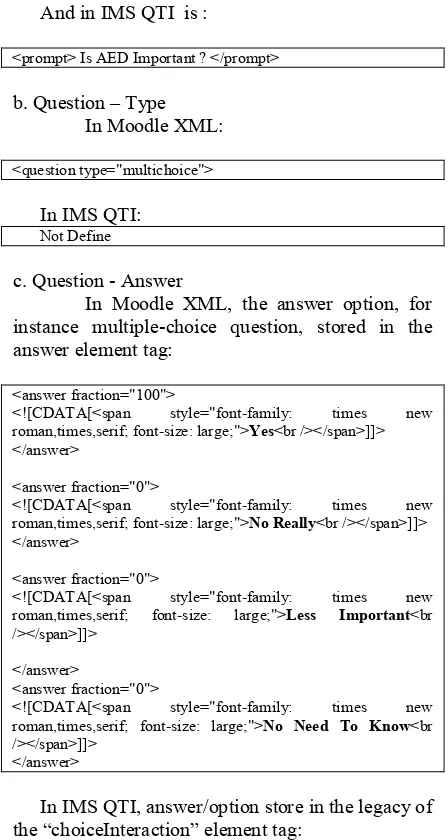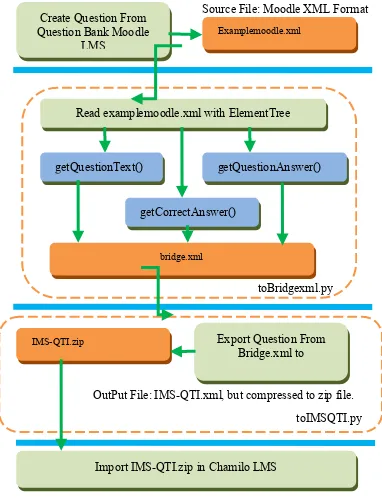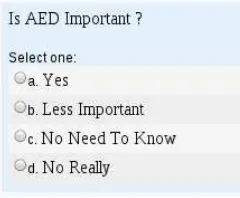From: ICTS 2013[email protected]
Subject: ICTS 2013 submission 9 Date: March 11, 2013 18:05
To: Irwan [email protected]
Dear authors,
We have successfully received your paper:
Authors : Irwan Alnarus Kautsar, Shin-Ichiro Kubota and Yasuo Musashi
Title : PORTABILITY MOODLE XML TO IMS QTI FOR SUPPORT INTEROPERABILITY OF ASSESSMENT TEST ON LEARNING MANAGEMENT SYSTEM
Number : 9
Track : Data Management
Thank you for submitting to ICTS 2013. Best regards,
From: ICTS 2013[email protected]
Subject: ICTS 2013 notification for paper 9 Date: April 17, 2013 12:55
To: Irwan Alnarus [email protected] Dear Irwan Alnarus Kautsar,
We are pleased to inform you that your paper titled MOODLE XML TO IMS QTI ASSESSMENT TEST PORTABILITY ON LEARNING MANAGEMENT SYSTEM has been accepted for inclusion in the ICTS 2013 proceeding. Furthermore, you are also required to present your paper in the ICTS 2013 conferences. Before doing so, please find the reviewer's comments at the end of this email. Please kindly revise your paper based on those comments, if any. Please send the camera-ready paper through our EasyChair account before April 26th, 2013.
Thank you for your participation, we are looking forward to seeing you in Bali.
Sincerely yours,
Dr. Ir. R.V. Hari Ginardi, M.Sc (General Chair)
-- REVIEW 1 ---PAPER: 9
TITLE: MOODLE XML TO IMS QTI ASSESSMENT TEST PORTABILITY ON LEARNING MANAGEMENT SYSTEM AUTHORS: Irwan Alnarus Kautsar, Shin-Ichiro Kubota, Yasuo Musashi and Kenichi Sugitani
REVIEW
PROCEEDINGS OF
THE 7
thINTERNATIONAL CONFERENCE ON
INFORMATION AND COMMUNICATION TECHNOLOGY
AND SYSTEMS (ICTS) 2013
Bali, May, 15
th-16
th, 2013
(ISSN : 9772338185001)
Organized by
Department Of Informatics,
Faculty Of Information Technology,
PROCEEDINGS OF
THE 7th INTERNATIONAL CONFERENCE ON
INFORMATION AND COMMUNICATION TECHNOLOGY AND SYSTEMS (ICTS) 2013
EXECUTIVE BOARD
Prof. Dr. Ir. Triyogi Yuwono, DEA
Rector
Dr. Agus Zainal Arifin, M.Kom
Dean of Faculty of Information Technology
Dr. Nanik Suciati, M.Kom
Head of Department of Informatics
KEYNOTE SPEAKERS
Prof. Tsuyoshi Usagawa (Kumamoto University)
Prof. Stephanne Bressan (National University of Singapore) Dr. Amin Anjamshoaa (TU Vienna, Austria)
SCIENTIFIC COMMITTEE
Prof. Tsuyoshi Usagawa (Kumamoto University, Japan)
Prof. Stephanne Bressan (National University of Singapore)
Prof. A Min Tjoa (TU Vienna, Austria)
Prof. Dr. Ir. Aniati Murni Arymurthy, M.Sc (UI, Indonesia)
Prof. Heru Suhartanto, Drs, M.Sc , PhD. (UI, Indonesia)
Prof Dr. Ir. Ing. Iping Supriana, DEA (ITB, Indonesia)
Prof. Dr. Ir. Bernhard Sitohang (ITB, Indonesia)
Prof. Ir. Supeno Djanali, M.Sc, PhD (ITS, Indonesia)
Prof. Ir. Handayani Tjandrasa, M.Sc, PhD. (ITS, Indonesia)
Prof. Drs.Ec. Ir. Riyanarto Sarno, M.Sc., PhD. (ITS, Indonesia)
Prof. Ir. Joko Lianto Buliali, M.Sc, PhD. (ITS, Indonesia)
Prof. Ir. Arif Djunaidy, M.Sc, PhD. (ITS, Indonesia)
Dr. Stefan Fenz (TU Vienna, Austria)
Dr. Fangyan Dong (Tokyo Institute of Technology, Japan)
Dr. Abdul M. Iliyasu (Tokyo Institute of Technology, Japan)
Dr. Oerip S. Santoso (ITB, Indonesia)
Dr. Retantyo Wardoyo, M.Sc (UGM, Indonesia)
Dra. Sri Hartati, M.Sc, PhD. (UGM, Indonesia)
Dr. Ir. R.V. Hari Ginardi, M.Sc (ITS, Indonesia)
Dr. Ir. Siti Rochimah, MT (ITS, Indonesia)
ORGANIZING COMMITTEE
Chairman
Dr. Ir. R.V. Hari Ginardi, M.Sc
Secretary
Dr. Chastine Fatichah, M.Kom
Program
Ridho Rahman Hariadi, M.Sc
Secretariat
Erina Letivina Anggraini, S.Kom
Tresurer
Nurul Fajrin Ariyani, M.Sc Fatin Fahima, SE
Website and Publication Rizky Januar Akbar, M.Eng Baskoro Adi Pratomo, M.Kom Teguh Indrasto, SE
Sugeng Susanto
Proceeding
Dr. Royyana Muslim Ijtihadie Ratih Nur Esti Anggraini, M.Sc
Documentation
Department of Informatics, Faculty of Information Technology,
Institut Teknologi Sepuluh Nopember (ITS) Surabaya Gedung Teknik Informatika, ITS
Jalan Teknik Kimia, Kampus ITS Sukolilo, Keputih, Surabaya, Indonesia 60111 Tel. +62-31-5939214 Fax. +62-31-5913804
6-09 SENTIMENT ANALYSIS ON INDONESIAN TWEET
Paulina Aliandu 203-208
6-10 MOODLE XML TO IMS QTI ASSESSMENT TEST PORTABILITY
ON LEARNING MANAGEMENT SYSTEM
Irwan Alnarus Kautsar, Shin-Ichiro Kubota, Yasuo Musashi, Kenichi Sugitani
209-214
6-11 RULE-BASED EXPERT SYSTEM FOR DIAGNOSING TODDLER
DISEASE USING CERTAINTY FACTOR AND FORWARD CHAINING
I Wayan Simri Wicaksana, Isram Rasal 215-220
7 - COMPUTER NETWORKS AND ARCHITECTURE
7-01 XBEE IMPLEMENTATION ON MINI MULTI-ROBOT SYSTEM
Andi Adriansyah, Yuliza 221-226
7-02 FORENSICS ARISING CHALLENGES WHEN SSD IS HEADING
FORWARDS REPLACING HDD
Niken Dwi Wahyu Cahyani 227-232
7-03 ACCELEROMETER DATA TRANSMISSION BASED ON
WIRELESS SENSOR NETWORK
Hafsah Nirwana, Zahir Zainuddin, Ibrahim Abduh, Muh Tola, Nadjamuddin Harun, M Bakri Muhiddin
233-238
7-04 POWER OPTIMIZATION IN HIGH AVAILABILITY SERVER
CLUSTER
Supeno Djanali, Hudan Studiawan 239-244
7-05 ANALYSIS OF PARALLEL COMPUTING IMPLEMENTATION
FOR ANT COLONY OPTIMIZATION ALGORITHM BY CONSIDERING NUMBER OF PROCESSORS
Fitriyani, Ummah Izzatul 245-250
7-06 FREQUENCY CHARACTERISTICS OF BONE CONDUCTION
ACTUATOR -LOUDNESS AND ACCELERATION-
Xiuyuan Qin, Yoshimi Fukuda, Yoshifumi Chisaki, Tsuyoshi Usagawa 251-256
7-07 DIRECTIVITY CONTROL OF LOUDSPEAKER SYSTEM IN LOW
FREQUENCY RANGE
MOODLE XML TO IMS QTI ASSESSMENT TEST PORTABILITY ON
LEARNING MANAGEMENT SYSTEM
Irwan Alnarus Kautsar *1, Shin-Ichiro Kubota*, Yasuo Musashi*, and Kenichi Sugitani* *Center for Multimedia and Information Technologies Laboratory
* Graduate School of Science and Technology, Kumamoto University 2-39-1 Kurokami, Central W., Kumamoto, JAPAN, 860-855
ABSTRACT
Learning Management Systems (i.e. LMS) is one of the most popular solutions towards the e-Learning objective in different universities all around the world, where this environments are used to not only deliver contents but to perform assessments, tests and other tasks related to learning. Although, there are popular LMS such as Moodle, and more developed, such as Chamilo, there is no assessment/test portability among their LMS. Each assessment export formats make difficult to transfer well done Moodle-based online courses into young platforms such as Chamilo. The purpose of this paper is to address this portability issue and to show possibility of exporting Moodle assessment data (i.e. Moodle XML), into a more standardized format, which is IMS Question & Test Interoperability (IMS QTI). That can be used not only in Chamilo, but also other LMSs globally. The present paper shows the first approach towards a
Educational Institution, especially in Indonesia, many universities implements Moodle as LMS, with over 1500 sites registered [1, 2]. To share contents with other universities is not a problem, although using different LMS, because Moodle already support SCORM (Sharable Content Object Reference Model) format for export and import learning contents. Besides learning contents itself, question or assessment is the main component for some LMS [3]. While Moodle own XML format enables sharing assessment among Moodle, sharing assessments to other LMS is becoming a problem [4].
Chamilo, a user friendly LMS with built in social network features, offers richer learning resources with different forms of communication for learners, which are already implemented in primary school, for instance in the ONLP per child project [5, 6, 7, 8]. Chamilo can already import SCORM type contents and import IMS QTI type assessments. IMS QTI standardization is organized by IMS Global Learning Consortium, with the goal of enable the exchange of question components, such as item, test and results data, between authoring tools, item banks, test constructional tools, learning systems and assessment delivery systems on other LMS [9].
Many question components can be exported in the Moodle XML format, because many universities already implemented well-known LMS Moodle and have many question components in it. It is natural that those question components are shared among universities [2]. The next generation LMS (e.g. Chamilo) users must also wish to share the question components. If the Moodle XML format is translated to the IMS QTI format, more question components could be shared. This is why LMS should be collaborative and interactive, to improve the quality of contents and assessments in learning process using any LMS [5, 10, 11, 12].
2
ANALYSIS, DESIGN AND
IMPLEMENTATION
2.1
Analysis IMS QTI Chamilo And
Moodle XML Format
In this research, we analyze Moodle 2.4, which is Moodle XML format has not been supported in IMS QTI [4]. We analyze the format difference, based on question/assessment component in Table 1 [13]. And for the sake of ease, our target question is the multiple-choice type.
6-10 Moodle Xml To Ims Qti Assessment Test Portability On Learning Management System
The problem we found after analyzing Moodle
b. When creating an example question in Moodle, there is the section “question 0” that not use in IMS QTI.
<!-- question: 0 -->
<question type="category"> <category>
<text>$system$/Default for System</text> </category>
</question>
For the purpose of this research, we start targeting the example multiple choice question type as first experiment, because this type of question is usual and simple, and they are adapted to our future work.
Table 1. Question Component and Value
No Question Component Value
a Text Is AED Important?
b Type Multiple-choice
c Answer - Yes
f Other Option Random
Using Table 1, we presented Moodle XML and IMS QTI formats one by one:
a. Question - Text
Moodle XML Format is is :
<questiontext format="html"> <text>
<![CDATA[<p><span style="font-family: times new roman,times,serif; font-size: large;"> Is AED Important ?</span></p>]]>
</text> </questiontext>
And in IMS QTI is :
<prompt> Is AED Important ? </prompt>
b. Question – Type In Moodle XML:
<question type="multichoice">
In IMS QTI:
Not Define
c. Question - Answer
In Moodle XML, the answer option, for instance multiple-choice question, stored in the answer element tag:
<answer fraction="100">
<![CDATA[<span style="font-family: times new roman,times,serif; font-size: large;">Yes<br /></span>]]> </answer>
<answer fraction="0">
<![CDATA[<span style="font-family: times new roman,times,serif; font-size: large;">No Really<br /></span>]]> </answer>
<answer fraction="0">
<![CDATA[<span style="font-family: times new roman,times,serif; font-size: large;">Less Important<br /></span>]]>
</answer>
<answer fraction="0">
<![CDATA[<span style="font-family: times new roman,times,serif; font-size: large;">No Need To Know<br /></span>]]>
</answer>
In IMS QTI, answer/option store in the legacy of
the “choiceInteraction” element tag:
<choiceInteraction responseIdentifier="QST_1" >
<simpleChoice identifier="answer_1" fixed="false"><p>Less Important</p>
</simpleChoice>
<simpleChoice identifier="answer_2" fixed="false"> <p>Yes</p>
</simpleChoice>
<simpleChoice identifier="answer_3" fixed="false"><p>No Need to Know</p>
</simpleChoice>
<simpleChoice identifier="answer_4" fixed="false"><p>No Really</p>
</simpleChoice> </choiceInteraction>
d. Question – Correct Answer.
In Moodle XML, the correct answer is indicated by the value of the “fraction” attribute in “answer” element, in each question answer/option.
<answer fraction="100"> <text>
<![CDATA[<span style="font-family: times new
roman,times,serif;font-“value” element in “correctResponse” element.
<correctResponse>
<value>answer_2</value> </correctResponse>
e. Question – other option
To randomize the answer, in MoodleXML, it sets the value “TRUE” in shuffleanswers element.
<shuffleanswers>true</shuffleanswers>
In IMS QTI, to get random question answer/option, it sets the value “Random” in
“order_type” attribute of “order” element:
<order order_type="Random" />
2.2
Portability Design
We propose in this research the use of the file named Bridge.xml (Figure 1) as a container file from the data obtained through Moodle XML. We will use the data contained in Bridge.xml as a source to write the IMS QTI format.
Figure 1. Portability Assessment process model item in both Moodle XML and IMS QTI.
The workflow of our research with the goal to create bridge.xml is:
Figure 2. Get assessment workflow item from Moodle XML.
Another function of Bridge.xml is used to store and became a question bank in the future work. With Bridge.xml, we enable getting other Moodle components learning content besides assessments. The structure of bridge.xml element is:
a. Root Element.
Bridge XML, start “question” tag as root
element tag. Purpose of this element tag is as direction for our script collected data, which is store in bridge.xml. The Element tag is:
<question> </question>
b. Question Data Element.
In some assessment, could be contain not only one or single question. For this matter,
used “questiondata” to store one single question, which some question, have question component and value, related to Table 1. The element tag is:
<questiondata> <questiondata>
Example Moodle XML
Bridge.xml
Example IMS QTI XML
Read and Write to bridge.xml Import to Moodle XML Format
Export to IMS QTI Format
toBridgexml.py Source File: Moodle XML Format
Examplemoodle.xml
Read examplemoodle.xml with ElementTree
OutPut File: IMS-QTI.xml, but compressed to zip file. getQuestionText()
Import IMS-QTI.zip in Chamilo LMS
6-10 Moodle Xml To Ims Qti Assessment Test Portability On Learning Management System
c. Question Text Element. Element.
This element contains a sentence that defines the question in this assignment. The element tag is :
<questiontext> </questiontext>
d. Question Type.
This element contains information about what type of question is being used, multiple choice, or True/False.
<questiontype> </questiontype>
e. Question Answer Element.
This component contains options that should be chosen by the learner. The element tag is :
<questionanswer> </questionanswer>
The attribute for question answer element, use for store information of each question answer shown in Table 2.
Table 2. Attribut of Question Answer Element.
No Attribute Example Value
1 Id 1
2 Score 100
3 Text Yes
Score attribute contains the correct answer or contains penalty score for an incorrect answer.
f. Correct Answer Element.
This component contains information about the correct answer to the question. The element tag is :
<correctanswer></correctanswer>
g. Other Option Element.
This Element contains other options for this question. The element tag is:
<randomoption></randomoption>
Figure 3. Example question from Moodle XML.
Using both python modules ElementTree [13] and BeutifulSoup4 [14], we get the necessary elements, attributes and values from Moodle XML (i.e. Question Type):
def getQuestionType(): # getting Question Type. global qtype
qtype = ""
tree = ET.ElementTree(file='examplemoodle.xml') for elem in tree.iter('question'):
qtype = str(elem.get('type')) if qtype == 'multichoice':
qtype = "multiplechoice"
The selected data from both assessment types (Moodle XML and IMS QTI), are stored in the bridge.xml file, where the structure meet our design approach. With example value from Table 1, the bridge.xml file that we generate with our python script is:
<?xml version = "1.0" encoding = "UTF-8"> <question>
<questiondata>
<questiontype>multiplechoice</questiontype> <questiontext>Is AED Important</questiontext> <questionanswer id=1 score=100 text=Yes/>
<questionanswer id=2 score=0 text =No Really/>
<randomption>True<randomoption> <questiondata>
</question>
After importing the question components from Moodle XML to Bridge.xml, and using this contained information as a source of the IMS QTI file, we succeed into show the quiz in the Chamilo LMS (Figure 4).
Figure 4. Quiz in Chamilo LMS from Moodle XML.
3
RESULT
Having the portability between Moodle XML and IMS QTI, we can use both Moodle and Chamilo LMS to present assessments, as shown and done with our approach. Bridge.xml is used to solve the format difference from Moodle XML to IMS QTI.
4
CONCLUSIONS
The present paper shows the first approach towards a more global portability tool for share other question component/assessment, question with different types and other learning object (learning content, forum and portfolio). This means not only assessments but the whole structure of the course could be easily exported to other platforms. As a future work, is necessary to develop to the following conditions:
a. Adding more other question types such as matching, True/False, Short Answer/Essay. b. Enabling import from Moodle into IMS-QTI
and vice versa with XSLT.
c. Translating Moodle XML to IMS QTI employing the XML Schema Design (XSD) from IMS Global Learning Consortium.
d. Integration between content and assessments in both Moodle and Chamilo.
REFERENCE
“Dynamic content synchronization between
learning management systems over limited
bandwidth network,” Human-centric
Computing and Information Sciences, vol.
2, no. 1, p. 17, Nov. 2012..
[3] P. Santos, D. Hernández-Leo, M. Pérez-Sanagustín, and J. Blat, “Modeling the Computing Based Testing domain extending IMS QTI: Framework, models
and exemplary implementations,”
Computers in Human Behavior, vol. 28, no. 5, pp. 1648–1662, Sep. 2012. Generation Open Source E-learning and
Collaboration Platform,” International Journal of Advanced Corporate Learning
(iJAC), vol. 3, no. 3, pp. pp. 26–31, Mar.
2010.
[6] “BeezNest Reveals LMS Chamilo’s Social Networking Functionalities and Their Potential Influence on Student Motivation -
PR.com.” [Online]. Available:
http://www.pr.com/press-release/295994. [Accessed: 11-Nov-2012].
[7] “Chamilo LMS becomes one of the most promising open-source projects at the packt
publishing awards | PRLog.” [Online]. challenging Hegemonies in Online
Learning”, Language Learning and
Technology, Vol. 16 No. 2. P4-13
6-10 Moodle Xml To Ims Qti Assessment Test Portability On Learning Management System
[9] “IMS Global Question and Test Interoperability (QTI) Specification.” [Online]. Available: http://www.imsglobal.org/question/. [Accessed: 10-Nov-2012].
[10] J. Chen, Q. Li, C. Y. K. Lin, H. Chang, and
C. Wang, “Application of innovative
technologies on the e-learning system,” in 2011 6th International Conference on
Computer Science Education (ICCSE),
Aug., pp. 1033–1036.
[11] S. Martin, G. Diaz, I. Plaza, E. Ruiz, M.
Castro, and J. Peire, “State of the art of
frameworks and middleware for facilitating mobile and ubiquitous learning
development,” Journal of Systems and
Software, vol. 84, no. 11, pp. 1883–1891,
Nov. 2011.
[12] P. J. Muñoz-Merino, C. D. Kloos, and J. F.
Naranjo, “Enabling interoperability for LMS educational services,” Comput. Stand.
Interfaces, vol. 31, no. 2, pp. 484–498, Feb. 2009.
[13] “19.5. xml.etree.ElementTree — The ElementTree XML API — Python v2.7.3
documentation.” [Online]. Available:
http://docs.python.org/2/library/xml.etree.el ementtree.html. [Accessed: 10-Jan-2013].
[14] “Beautiful Soup:” [Online]. Available: http://www.crummy.com/software/Beautifu lSoup/. [Accessed: 10-Jan-2013]



